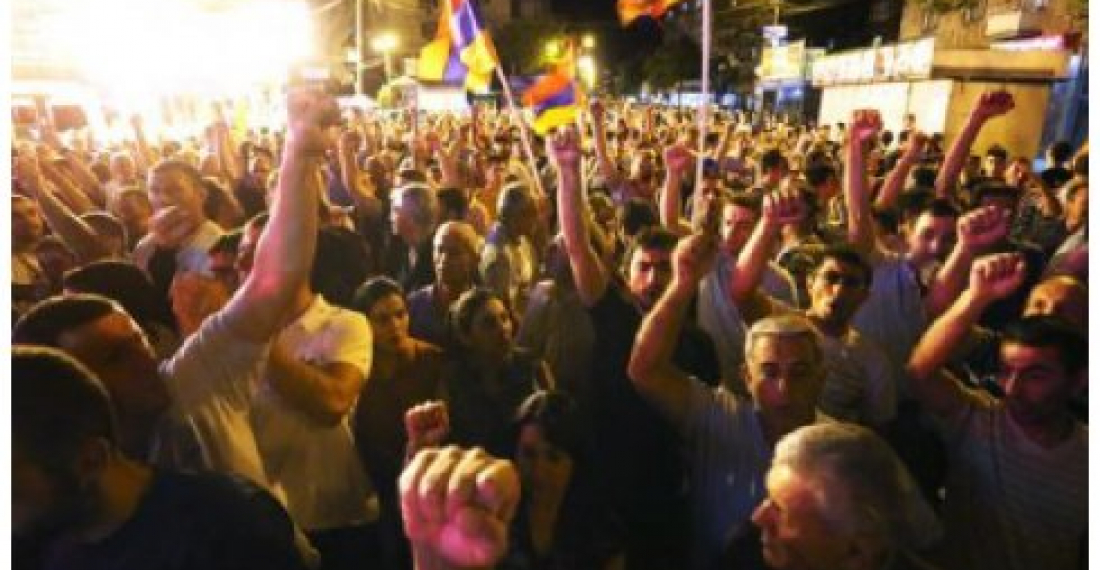This is a commentary prepared by the political editor of commonspace.eu.
The two week occupation of an Armenia police station by a group of armed men intent on bringing down the Armenian government came to a close yesterday when they surrendered, saying that they had done their part to trigger a revolt, and that it was now the people’s turn to continue it. Two police officers died during the stand-off, several of the armed group were injured, and many people who were demonstrating in favour of the calls of the armed group suffered injuries after police attempts to disperse them by force.
It has been a bad two weeks for Armenia. Most Armenians reject the idea of trying to bring about change by force. It took some time for people to come out on the streets to support the armed men, and once they did the numbers were never large enough to threaten the government, but by the time of their surrender Armenian society was split, between those who think the gunmen were criminals and terrorists, and others who looked at them as national heroes. There is however a general opinion that the government has mishandled the crisis, and that something in Armenian politics has to change.
The attitude of the Armenian government in the past was to treat the occasional outburst of public discontent as little more than an inconvenience, caused by a tiny minority. They have tried to do the same this time too, trying to minimise the importance of the event and considering it as a police anti criminal operation rather than a political upheavel. There was hardly any comment during the crisis by the President and Prime Minister, and despite the calls of civil society, parliament was not reconvened from its summer holidays. Heavy handed police tactics, including violence against journalists covering the events further added to the discontent.
It is very obvious that whilst this strategy may have worked in the past, on this occasion, it misfired. Erebuni was different because it connected several issues together, and brought together many of the malcontents in Armenian society. Whilst it has not achieved immediately the objective of mobilising a critical mass on the streets that was large and determined enough to bring down the government, it has sown the seeds for this eventuality in the future.
The members of the armed group were mainly veterans of the Karabakh War. Karabakh war veterans in Armenia consider themselves, and more importantly are considered by wider society, as the guarantors for safeguarding Armenia’s gains in that war. An underlying theme of the stand-off of the last two weeks, although never properly articulated, was that the government of president Serzh Sargsyan was selling-out on Karabakh under pressure from Russia. For some, this justified the group’s violent means.
This theme, and the overall methods used by the group, has less resonance with the younger generation, who are most critical of the government of Serzh Sargsyan, and who still empathised with the armed group despite their methods. They took to the streets because they saw this as a moment when they could trigger change. One participant in the protest on Saturday, possibly the largest of the daily gatherings during the stand-off, tweeted that the people around her were well educated and earned more than average. This group now constitutes the most dangerous challenge to the current Armenian authorities. Their complaints go beyond Karabakh, and are related to deeper problems of governance and political outlook.
The third theme had an anti-Russian undertone. Whilst rarely attacking Russia directly there were, both in the expressions of the armed group, as well as those supporting them outside references to Armenia losing its independence to a foreign power. This concern is widespread in Armenia, where anti-Russian feeling is nowadays not too deep beneath the surface.
And finally, the forth theme was free elections, and a sense that Erebuni was a violent and ugly start to the campaign in an election that is not due until next year, but that is already being seen as crucial for Armenia’s future. A reference to stolen elections, election fraud and the need to ensure that the 2017 election is free could be heard throughout the two-week protest. A number of opposition politicians, including former Presidential candidate Raffi Hovhanessian, joined the protesters in the last days of the two-week crisis. None however had the moral authority to set the agenda for the protest actions – this outburst started and finished as a hydra headed protest, which is why it was always difficult to quantify and define.
With the members of the armed group in jail, the ball is now in the government’s court. Most Armenians do not want to see violence on the streets of Yerevan again, but most believe that Erebuni may be the sign of things to come unless the government shows a vision and a resolve to implement the necessary changes. At the moment the initiative is out of the government’s hand. The next days and weeks will show if they are able to regain it in time to avoid further bloodshed. With the credibility of the government seriously under question only a genuine expression of opinion through the ballot box may resolve the current impasse. In the meantime the Armenian government is being asked to make big decisions on issues related to the future of Karabakh. Erebuni has exposed the fragility in Armenian politics, the extent of which neither president Putin nor Western countries, seem to have understood up to now. They have continued working on the assumption that the Presidents of Armenia and Azerbaijan can deliver peace on Karabakh. Erebuni is a further example that on their own, they cannot.
This is a commentary prepared by the political editor of commonspace.eu.
photo: Demonstrators on the streets of Yerevan during the Erebuni crisis (picture courtesy of Radio Liberty)







